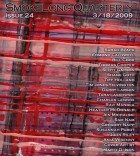The absent mother keeps coming up in the boy’s cheers–the one he writes for her and during the football game, when he imagines “cheering her home”–but we’re never told exactly what has happened to her. How did you make the decision to leave her whereabouts ambiguous?
The why and where questions didn’t seem particularly important, since the story is more about the consequences of her departure than the reasons for it. Also, since it’s something that goes unspoken in their household, to detail her whereabouts would probably be too much of an auctorial intrusion, especially in a piece this short.
The narrator claims he didn’t receive any ridicule about his goal from father or classmates. He believes that his father feared being a cliché and his classmates feared his high kicks, which raises the question of his reliability and makes me wonder how emotionally safe he really was. What do you think? How safe was he?
The character seems to exist in a world of his own. If he is being teased by the other kids, or failing to recognize his father’s disapproval, I think he’s blocking it out. And the only reason the cheerleader is able to get through to him is because she’s a part of his private world.
When you moved in time, from the cheerleaders’ signing to the televised football game, I got the impression that his dream had been lost due to the cheerleader’s callous remark. What happened between those two scenes?
Like you said, I think the dream is tarnished. He’s forced to face the sheer improbability of his aspirations.
The story subtly raises the question of protection in parenting, contrasting the father’s protection and what he imagines about the mother: when he sees her cradling the ball, fending off other players with a stiff arm, the image of an infant comes to mind.
I think the father is doing his best to protect his son, but a mother’s capacity to nurture and care for a child is singular. That isn’t to say that a single man can’t successfully raise a child on his own, or two men (or three men – Full House taught us that), just that men aren’t typically built with the same caretaking hardware as women.
I noticed in your blog bio that you have a great idea for a coffee table book. Could you say more about this?
I’ve been waiting for someone to ask me about it. It’s a book of terrible parking jobs (patent pending). At some point, I’d like to invite other bad driving enthusiasts to submit images of parking jobs along with hilarious captions. (“Nice park job, knucklehead.” No, wait, wait, that isn’t a very good example. Oh, you get the idea). If my intuition is correct, it’ll be the biggest thing to hit coffee tables since Richard Gere photographed Tibet.



 The core workshop of SmokeLong Fitness is all in writing, so you can take part from anywhere at anytime. We are excited about creating a supportive, consistent and structured environment for flash writers to work on their craft in a community. We are thrilled and proud to say that our workshop participants have won, placed, or been listed in every major flash competition. Community works.
The core workshop of SmokeLong Fitness is all in writing, so you can take part from anywhere at anytime. We are excited about creating a supportive, consistent and structured environment for flash writers to work on their craft in a community. We are thrilled and proud to say that our workshop participants have won, placed, or been listed in every major flash competition. Community works.